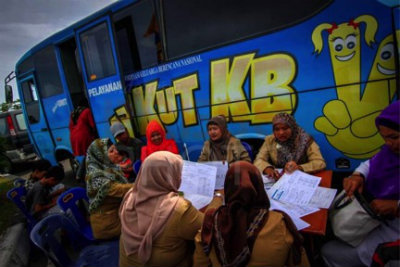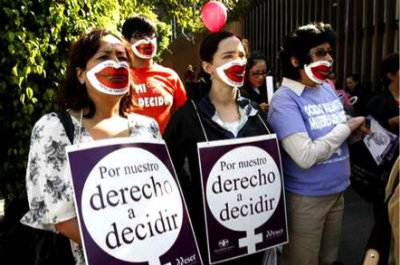There are currently 220 million women worldwide who want but don't have access to effective methods of contraception and family planning services. Reproductive health is important at both the family level and the national level: by reducing health care costs, infant mortality, adolescent pregnancies and unsafe abortions, families can invest in the children they choose to have, and the nation's population growth rate slows. Access to family planning resources is especially crucial in cities, where the effects of rapid urbanization in addition to population growth present additional challenges. Read on to learn about family planning solutions in Jakarta, São Paulo, Mexico City, and Mumbai, then share your thoughts on URB.im.
 Jakarta's government-led family planning services are prime examples of Indonesia's longstanding national family planning program, which aims to improve reproductive health in addition to limiting population growth. One of the national strategies is to hire neighborhood family planning officers who spread information about available resources and encourage changes in behavior. The city government of Jakarta has gone a step further by creating an SMS service that allows residents, especially those in poorer communities, to text message questions to family planning authorities who will then send medical workers to help with the issue. The government also runs community empowerment and family planning buses, which provide mobile reproductive health services and contraceptives across five of Jakarta's municipalities.
Jakarta's government-led family planning services are prime examples of Indonesia's longstanding national family planning program, which aims to improve reproductive health in addition to limiting population growth. One of the national strategies is to hire neighborhood family planning officers who spread information about available resources and encourage changes in behavior. The city government of Jakarta has gone a step further by creating an SMS service that allows residents, especially those in poorer communities, to text message questions to family planning authorities who will then send medical workers to help with the issue. The government also runs community empowerment and family planning buses, which provide mobile reproductive health services and contraceptives across five of Jakarta's municipalities.
São Paulo's public health network operates over 400 health centers that make reproductive health information and support available to the city's more than 2 million women of childbearing age. São Paulo's extensive reproductive health services stem from Brazil's legal recognition of family planning as a right for all women since the mid-1990s. The government has invested in programs like the National Family Planning Policy, which promotes the distribution of free condoms and strengthens educational campaigns that target adolescents. Additionally, eight different contraceptive methods are currently offered for free through Brazil's Single Health System. And most importantly, local health agents are on hand to provide free information at health centers and home visits so that people can learn more about their family planning options.
 In Mexico City, civil society organizations and the city government are strengthening access to family planning from different angles. Urban Community Program of the Mexican Foundation for Family Planning (MEXFAM) is a nonprofit that operates in marginalized urban areas where trained community workers conduct outreach and provide information, primary care, and referrals to good quality services for basic and reproductive health. Medical offices have also been established in target areas so that referred patients have access to professional consultation. In addition to services provided by groups like MEXFAM, the city government's regulatory framework has also made a significant impact on family planning. For instance, Mexico City's legislative assembly approved a reform law that decriminalizes abortion before the twelfth week of gestation. Since the reform, the Federal District has seen a rise in private organizations such as British NGO Marie Stopes that support contraceptive treatment and the legal interruption of pregnancies, as well as a halt in reported deaths caused by illegal abortions.
In Mexico City, civil society organizations and the city government are strengthening access to family planning from different angles. Urban Community Program of the Mexican Foundation for Family Planning (MEXFAM) is a nonprofit that operates in marginalized urban areas where trained community workers conduct outreach and provide information, primary care, and referrals to good quality services for basic and reproductive health. Medical offices have also been established in target areas so that referred patients have access to professional consultation. In addition to services provided by groups like MEXFAM, the city government's regulatory framework has also made a significant impact on family planning. For instance, Mexico City's legislative assembly approved a reform law that decriminalizes abortion before the twelfth week of gestation. Since the reform, the Federal District has seen a rise in private organizations such as British NGO Marie Stopes that support contraceptive treatment and the legal interruption of pregnancies, as well as a halt in reported deaths caused by illegal abortions.
The Society for Nutrition, Education and Health Action's (SNEHA) Family Planning Program works with married women in Mumbai's slum communities to help reduce unplanned pregnancies and to encourage the use of modern contraceptive methods as an alternative to unsafe abortions. While many married women are often aware of available contraceptives, the taboo around the subject makes it difficult to convince women and their husbands to use them. As a result, SNEHA's outreach methods rely upon pre-existing, trusted relationships between women: in the slums of Mumbai, 90 percent of all women who have taken up family planning methods have done so directly through a peer educator. The organization also focuses on creating more open conversations about sexual and reproductive health at a young age--and not just with girls, but with boys as well. Outreach to adolescents has already successfully reached 1,500 girls and 300 boys, and SNEHA is training some of the young women to become facilitators and educators themselves.
Free contraceptives, progressive legislation, text messages, mobile reproductive health services and community-based outreach--these are just some of the ways cities are transforming urban approaches to family planning. Visit URB.im to learn more about these initiatives and to join the conversation.
Photo credits: Antara Jateng, Animal Político